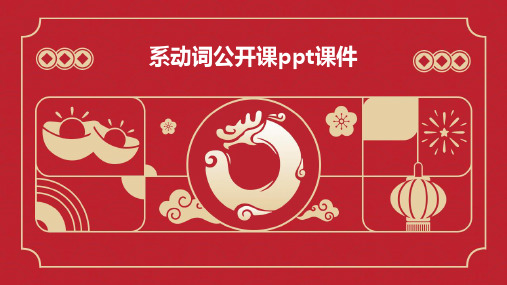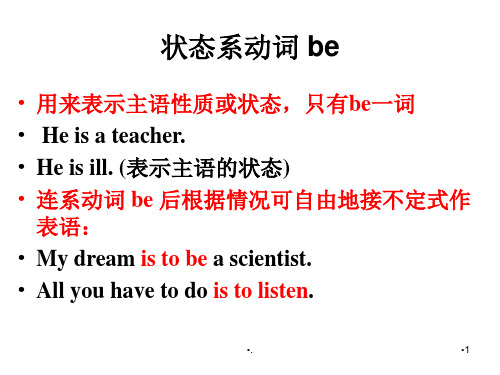(完整版)连系动词及其用法.ppt
合集下载
连系动词 课件

What we need badly are good textbooks .
4. 门被男孩打开了。窗户是开着的。 The door was opened by the boy. The window is open .
5. 那里有五棵树。是去年栽的。 There are five trees over there. They were planted last year
The film is moving . 电影很动人。moving (为分词形式的)
形容词
I. 翻译并比较:(判断是否是联系动词) 1.我们班都在外面操场上。
Our class are all out on the playground 2. 站在那儿的妇女是干什么的?
What are the women standing over there ? 3.我们急需要的是好教材。
The plant which I grew in my garden is growing higher and higher.
II.填入适当的词使句意完整 1. It _w_a_s_ he who found the lost purse钱包. 2. _A_r_e_ the students looking over the
教授在家。 at home 为介词短语
The computer is mine . 这台计算机是我的。mine 为代词
Five and six is eleven . 五加六等于十一。eleven为数词
He is out . 他出去了。out 为副词
My job is looking after the children . 我的工作是照看小孩。 looking...为动名词短语
4. 门被男孩打开了。窗户是开着的。 The door was opened by the boy. The window is open .
5. 那里有五棵树。是去年栽的。 There are five trees over there. They were planted last year
The film is moving . 电影很动人。moving (为分词形式的)
形容词
I. 翻译并比较:(判断是否是联系动词) 1.我们班都在外面操场上。
Our class are all out on the playground 2. 站在那儿的妇女是干什么的?
What are the women standing over there ? 3.我们急需要的是好教材。
The plant which I grew in my garden is growing higher and higher.
II.填入适当的词使句意完整 1. It _w_a_s_ he who found the lost purse钱包. 2. _A_r_e_ the students looking over the
教授在家。 at home 为介词短语
The computer is mine . 这台计算机是我的。mine 为代词
Five and six is eleven . 五加六等于十一。eleven为数词
He is out . 他出去了。out 为副词
My job is looking after the children . 我的工作是照看小孩。 looking...为动名词短语
系动词公开课PPT课件

主句之间的逻辑关系。
be与助动词连用
总结词:虚拟语气
详细描述:在虚拟语气中,系动词be可以与其他助动词一起使用,构成“would/should/might/could be+动词ing”或 “would/should/might/could be+过去分词”结构。这些结构用于表达与现实相反的情况或假设条件,强调某个动作或状 态的可能性或假设性。
02 系动词的常见形式
CHAPTER
be型系动词
总结词
表示状态和特征
详细描述
be型系动词包括am, is, are, was, were等,用于描述主语的状态或特征,例如 “I am tall.”(我个子高)。
感官系动词
总结词
描述感知和经验
详细描述
感官系动词包括feel, sound, taste, look, smell等,用于描述主语给人的感觉或经 验,例如“The music sounds beautiful.”(音乐听起来很美)。
谢谢
THANKS
总结词:常见用法
详细描述:在英语中,系动词be经常与其他助动词一起使用,以构成各种时态、 语态和语气。常见的be与助动词连用的结构包括“be+助动词+动词ing”和 “be+助动词+过去分词”。这些结构在表达时间、条件、目的和方式等方面具 有重要作用。
be与助动词连用
总结词
非谓语动词形式
详细描述
系动词be可以与不定式或动名词形式的非谓语动词连用,构成“be+不定式”或 “be+动名词”结构。这种结构常用于表达目的、条件或结果,强调某个动作或状态与
变化系动词
总ห้องสมุดไป่ตู้词
be与助动词连用
总结词:虚拟语气
详细描述:在虚拟语气中,系动词be可以与其他助动词一起使用,构成“would/should/might/could be+动词ing”或 “would/should/might/could be+过去分词”结构。这些结构用于表达与现实相反的情况或假设条件,强调某个动作或状 态的可能性或假设性。
02 系动词的常见形式
CHAPTER
be型系动词
总结词
表示状态和特征
详细描述
be型系动词包括am, is, are, was, were等,用于描述主语的状态或特征,例如 “I am tall.”(我个子高)。
感官系动词
总结词
描述感知和经验
详细描述
感官系动词包括feel, sound, taste, look, smell等,用于描述主语给人的感觉或经 验,例如“The music sounds beautiful.”(音乐听起来很美)。
谢谢
THANKS
总结词:常见用法
详细描述:在英语中,系动词be经常与其他助动词一起使用,以构成各种时态、 语态和语气。常见的be与助动词连用的结构包括“be+助动词+动词ing”和 “be+助动词+过去分词”。这些结构在表达时间、条件、目的和方式等方面具 有重要作用。
be与助动词连用
总结词
非谓语动词形式
详细描述
系动词be可以与不定式或动名词形式的非谓语动词连用,构成“be+不定式”或 “be+动名词”结构。这种结构常用于表达目的、条件或结果,强调某个动作或状态与
变化系动词
总ห้องสมุดไป่ตู้词
连系动词及其用法PPT课件

•5
2.系动词的固定搭配
•6
状态变化系动词
多指朝坏的方面变化,
wrong, bad, mad, hungry, blind etc.
•7
come, get, fall, grow, turn, go, become,run ❖ 1.When we__g_r_o_w__up, we're going to help
interest for over an hour.
A. hold B. make C. improve D. receive •20
3. We have adjusted all the lights in the classrooms so that each room is well lit.
证明,证实,实义动词
2.He proved (to be) brave in the battle.
结果证明是,系动词
= He turned out (to be) brave.
A.C__an__y_o_u_p_r_o_v_e_i_t _to__m_e__?
你能向我证实它吗?
B.T_h_e__t_h_e_o_r_y__p_r_o_v_e__s_r_ig.ht
It seems/appears that he is watcing TV.
•13
❖Sb seems to be … ❖It seems that…
•14
常见连系动词的用法总结:
1. seem
2. become
seem (to be) +表语
become + noun.
seem to have done sth. become + adj.
2.系动词的固定搭配
•6
状态变化系动词
多指朝坏的方面变化,
wrong, bad, mad, hungry, blind etc.
•7
come, get, fall, grow, turn, go, become,run ❖ 1.When we__g_r_o_w__up, we're going to help
interest for over an hour.
A. hold B. make C. improve D. receive •20
3. We have adjusted all the lights in the classrooms so that each room is well lit.
证明,证实,实义动词
2.He proved (to be) brave in the battle.
结果证明是,系动词
= He turned out (to be) brave.
A.C__an__y_o_u_p_r_o_v_e_i_t _to__m_e__?
你能向我证实它吗?
B.T_h_e__t_h_e_o_r_y__p_r_o_v_e__s_r_ig.ht
It seems/appears that he is watcing TV.
•13
❖Sb seems to be … ❖It seems that…
•14
常见连系动词的用法总结:
1. seem
2. become
seem (to be) +表语
become + noun.
seem to have done sth. become + adj.
系动词及其用法

去完成)
❖ 5. 是否他会成功还有待观察。 It remains to be seen/observed whether he will succeed
1. The cloth that __A___ smooth and soft ______. A. feels; sells well B. feels; is well sold C. is felt; sells well D. is felt; sells good
证明,证实,实义动词
2.He proved (to be) brave in the battle.
结果证明是,最终显现为,系 动词
= He turned out (to be) brave.
A.C__an__y_o_u_p_r_o_v_e_i_t _to__m_e__? 你能向我证实它吗?
B.T_h_e__t_h_e_o_r_y__p_r_o_v_e__s_r_ig.ht 这个理论结果证明是对的。
sold out.
A. Tasted
B. Being tasted
C. Tasting
D. To taste
3. Happy birthday, Alice! So you have
___B___ twenty-one already.
A. become
B. turned
C. grown
D. passed
7. I haven’t seen Mary these past few days. I’m afraid she __B__ herself for some time. A. isn’t feeling B. hasn’t been feeling C. hadn’t been feeling D. wasn’t feeling
❖ 5. 是否他会成功还有待观察。 It remains to be seen/observed whether he will succeed
1. The cloth that __A___ smooth and soft ______. A. feels; sells well B. feels; is well sold C. is felt; sells well D. is felt; sells good
证明,证实,实义动词
2.He proved (to be) brave in the battle.
结果证明是,最终显现为,系 动词
= He turned out (to be) brave.
A.C__an__y_o_u_p_r_o_v_e_i_t _to__m_e__? 你能向我证实它吗?
B.T_h_e__t_h_e_o_r_y__p_r_o_v_e__s_r_ig.ht 这个理论结果证明是对的。
sold out.
A. Tasted
B. Being tasted
C. Tasting
D. To taste
3. Happy birthday, Alice! So you have
___B___ twenty-one already.
A. become
B. turned
C. grown
D. passed
7. I haven’t seen Mary these past few days. I’m afraid she __B__ herself for some time. A. isn’t feeling B. hasn’t been feeling C. hadn’t been feeling D. wasn’t feeling
初中英语语法课件 连系动词的基本用法

初中英语语法
content
表示状态或状态变化 的连系动词
表示感官的连系动词 表示变化或结果的连系动词
ONE
表示状态或状态变 化的连系动词
连系动词本身有词义,但是不 能单独充当谓语,后面必须跟 表语构成系表结构,说明主语 的状况、性质、特征等情况。
(1)表示状态或状态变化的连系动词
He always kept silent at meetings. 他开会时总是保持沉默。 表示主语的状态
(1)表示状态或状态变化的连系动词
Everyone seemed to be very happy. 每个人似乎都很高兴。 表示主语的变化
常见的表示状态(变化)的连系动词
seem似乎 grow渐渐变得
appear看起来
turn变得 prove证明是
remain保持
keep保持 stay继续处于……状态 get成为
(2)表示感官的连系动词
This kind of cloth feels soft. 这种布料手感柔软。 连系动词+adj.
(2)表示感官的连系动词 Your words don't sound right. 你的话听起来不对。 连系动词+adj.
感官动词表示被动含义时, 不能用于进行时态,表示主 动含义时可以用于进行式, hear、see通常分别以其相应 意义的介系词动词;listen to、 look at的进行式来代替。
指颜色的变化时,多用turn. The leaves turn yellow in autumn. When she saw this,she turned red.
连系动或状态变化的连系动词 不能单独充当谓语,后须跟表语构成系表结构,说明主语的状况、性质、特征等情况。 He always kept silent at meetings.他开会时总是保持沉默。 2. 表示感官的连系动词 sound(听见),see(看见),watch(观看),look(看),feel (感觉)notice(注意 到)、observe(观察)、taste(尝起来)、smell(闻起来)等。 I'm feeling the fur coat. 我在摸这件毛皮大衣。 3. 表示变化或结果的连系动词 表示变化或结果的连系动词有 become, fall, get, go, grow, turn等。 The country is getting richer and richer. 这个国家日益富有。
content
表示状态或状态变化 的连系动词
表示感官的连系动词 表示变化或结果的连系动词
ONE
表示状态或状态变 化的连系动词
连系动词本身有词义,但是不 能单独充当谓语,后面必须跟 表语构成系表结构,说明主语 的状况、性质、特征等情况。
(1)表示状态或状态变化的连系动词
He always kept silent at meetings. 他开会时总是保持沉默。 表示主语的状态
(1)表示状态或状态变化的连系动词
Everyone seemed to be very happy. 每个人似乎都很高兴。 表示主语的变化
常见的表示状态(变化)的连系动词
seem似乎 grow渐渐变得
appear看起来
turn变得 prove证明是
remain保持
keep保持 stay继续处于……状态 get成为
(2)表示感官的连系动词
This kind of cloth feels soft. 这种布料手感柔软。 连系动词+adj.
(2)表示感官的连系动词 Your words don't sound right. 你的话听起来不对。 连系动词+adj.
感官动词表示被动含义时, 不能用于进行时态,表示主 动含义时可以用于进行式, hear、see通常分别以其相应 意义的介系词动词;listen to、 look at的进行式来代替。
指颜色的变化时,多用turn. The leaves turn yellow in autumn. When she saw this,she turned red.
连系动或状态变化的连系动词 不能单独充当谓语,后须跟表语构成系表结构,说明主语的状况、性质、特征等情况。 He always kept silent at meetings.他开会时总是保持沉默。 2. 表示感官的连系动词 sound(听见),see(看见),watch(观看),look(看),feel (感觉)notice(注意 到)、observe(观察)、taste(尝起来)、smell(闻起来)等。 I'm feeling the fur coat. 我在摸这件毛皮大衣。 3. 表示变化或结果的连系动词 表示变化或结果的连系动词有 become, fall, get, go, grow, turn等。 The country is getting richer and richer. 这个国家日益富有。
系动词及其用法PPT课件

03
系动词的特殊用法
与介词连用的系动词
be与in的连用
表示“在某一方面/方面存在”。 例如:He is in charge of the project. (他负责这个项目。)
be与on的连用
表示“在某一方面/方面进行中” 。例如:The meeting is on next week. (会议在下周进行。)
系动词及其用法PPT 课件
目录
• 系动词的定义与分类 • 系动词的基本用法 • 系动词的特殊用法 • 系动词的常见错误用法 • 系动词的练习与巩固
01
系动词的定义与分类
什么是系动词
01
系动词是用来连接主语和表语的 动词,表示主语的特征、状态或 性质。
02
它通常出现在句子的谓语部分, 用来描述主语的状态或情况。
表示状态的持续与变化
be与表示时间的介词连用
表示状态的持续。例如:I will be at work until 5 o'clock. (我将工作到5点。)
be与表示变化的介词连用
表示状态的变化。例如:The weather is becoming warmer. (天气正在变暖。)
表示主语的属性与特征
表语性动词与行为动词的混用
总结词
将表语性动词误用作行为动词
VS
详细描述
有些动词既可以作为表语性动词(表示主 语的属性或状态),也可以作为行为动词 (表示主语执行的动作)。在使用这些动 词时,应避免混淆其用法。例如,应使用 "The movie is over"(表语性用法)而不 是"The movie over"(行为动词用法)。
be与形容词连用
表示主语的属性。例如:The book is interesting. (这本书 很有趣。)
高考英语二轮专题复习课件:连系动词及其用法(56张PPT)

get + 过去分词
❖ “get + 过去分词” 有被动含义, 用来突发事件 或事故。
❖ 与get搭配的过去分词比较少,有:
broken, caught, hurt, killed, changed, married, engaged, paid, dressed, stuck, separated等。
He was like a cat in hot bricks锅 before his test.
A cat? Why not an ant(蚂蚁)?
Yes,no reason. Just a set expression固定表达.
系动词的固定用法 (选词填空)
come, get, fall, grow, turn, go, become, run
系动词
用法
习惯搭配
go turn
grow fall come
多指朝坏的方面变化或颜色 变化
bad, mad, hungry, blind,wrong, etc.
表 “颜色、职业、年龄、时间”
等
接单数名词时,,单数名词
前不接冠词
表“成长,发展”中的变化
strong, tall, thick, healthy etc.
❖ 1.When we_g_r_o_w___tall, we're going to help
❖ build up our country.
❖ 2. He has _b_e_c_o_m_e_an excellent actor.
❖ 3.The meat___w_e_n_t_bad yesterday.
2)状态系动词 用来表示主语的性质或状态,只有be一词, 有 am、 is 、 a、re w、as 、were been
系动词用法课堂PPT

mother.
•.
•12
• While I was doing my homework, my little sister fell asleep.
• She fell ill from cold. • The naughty boy fell silent suddenly.
• fall apart(散开) fall flat (没效果)
• Don’t let the children run wild. • grow常指逐渐的变化,表示身高、岁数的增长。
• My little brother has grown much taller in the past year.
• She grew thinner and thinner.
• He fell an victim to cancer.
• 2. 表变化的系动词用于进行时态时,表示逐渐的 变化。
• The days are getting/ becoming longer and longer.
• She is growing to be more and more like her
•.
•11
• 注意:1. become, turn, go, get, fall后面能接名词 作表语,其他则不能. turn和go后面的名词不带冠 词。
• His dream has become/ got a reality.
• He has turned scientist.
• She has gone artist.
•.
•10
• become “变成;变为”(好坏均可),语气正式, 且不能用于将来时态,强调结果.表人的身体状 况,情绪,天气和社会变化时可与get互换使用.
高中英语Linking Verb-系动词及其用法 23张PPT

动词过去分词充当表语
④ Mary’s daily job is cleaning the house. 动词- ing形式充当表语
⑤ The house is not only large but also beautiful. 形容词充当表语
⑥ When I went to your house, you were out. ⑦ No one was in the dorm, when she arrived. ⑧ My job is to teach you English.
词 的 分
类 6.终止系动词如prove, turn out, 表达
“证实”,“结果是”之意
常见类型归纳: be 动词(am,is,are) 感官动词(feel,look,smell,sound,taste,seem) “变得”词(get,become,turn,grow) “保持”词(remain)
Linking Verbs (连系动词)
除动词be以外,还有一些后面可接表语的特殊连系 动词,如:look, smell, taste, sound, feel, fall, come, go
(变成…), become, grow(渐渐地变化), turn(变成, 一般用于颜色), appear, seem, get, keep, remain, stay等。
Eg. (例子)
① The person stood in front of you just now is my headmaster. 名词充当表语
② I didn’t know that it was you at that time. 代词充当表语
③ The door remained closed.
- 1、下载文档前请自行甄别文档内容的完整性,平台不提供额外的编辑、内容补充、找答案等附加服务。
- 2、"仅部分预览"的文档,不可在线预览部分如存在完整性等问题,可反馈申请退款(可完整预览的文档不适用该条件!)。
- 3、如文档侵犯您的权益,请联系客服反馈,我们会尽快为您处理(人工客服工作时间:9:00-18:30)。
4. “状态持续”类 :表示主语持续某种 状态。
常见的有: remain(依然),keep(保持), stay(保持),lie (呈…状态,置于), continue(继续、仍旧)等。例如: —Why don't you put the meat in the
fridge? —It will stay fresh for several days. The population growth in China remains a problem. The book lay open on the desk.
连系动词(即系动词)用于连接主语和 表语,说明主语的状态,性质,特征或 身份。表语通常由名词、形容词,或相 当于名词或形容词的词或短语等充当, 说明主语是什么或怎么样。
常见的系动词是be,它的变化形式为: am/is/are/was/were . 除了 be 动词, 其他的系动词(半系动词)大致可 分为四类:
Choose the best answer
4. ----I was wondering if we could go skating on the weekend.
----_____ good.
A.Sound
B.Sounded
C.Sounding D.Sounds
As time went on, his theory proved (to be) true.
It appears/seem that she will win.
3. “状态变化”类: 表示主语从一种 状态变化成另一种状态。
常见的有: become, turn, grow, go, come, fall, get 等。 例如: Put the fish in the fridge, or it will go bad in hot weather.
me.
Choose the best answer
1. His method should be popularized; it ___ practical. A. proves B. is proved C. has been proved D. was proved
2. To everybody's great surprise, the fashionable young lady ____ to be a thief. A. found out B. proved out C. put out D. turned out
系动词一般现 +(to be) adj./ n. 在或过去时
+ to doຫໍສະໝຸດ sth.不定式可用各 种形式
become, turn, grow, get, go, come, fall, etc.
+ adj.
+ n. 注意记忆 惯用搭配
现在\过去\ 将来\进行\ 完成时
主动表被动
系动词主动表被 动 不定式可主动或 被动
dress.
2. “主观判断”类 : 包括 seem(似乎是), appear(似乎、显得 ),prove(证明是 ), turn out (结果是, 证明是) 等.
例如:
He appears/seem to be very friendly with us. They appear/seem to have misunderstood me.
1.“感觉”类:与五种感觉器官相关的动 词.常见的有: look(看起来), feel(摸上去),smell(闻起来) , taste(尝起来),sound(听起来)等。 例如:
What he says sounds (like) a good idea. Those oranges taste good. She looks much younger in her red
2. He shook his head ______ and looked ____ when he was told the bad news.
A.sadly; sadly B.sad; sad
C.sadly; sad
D. sad; sadly
Choose the best answer
3. I love to go to the forest in summer. It ____ good to walk in the forest or sit in the shade of trees. A. does B. feels C. gets D. makes
半系动词 词汇
用法
时态
语态
感官性 系动词 主观判断 系动词
状态变化 系动词
look, sound, smell, taste, feel etc.
+ adj. + like + n.
一般现在或过去时
( 特殊: feel )
seem, appear, turn out, prove, happen etc.
Everything turned out (to be) well.
He seems to know everything.
I happened to be standing next to him when he fell. They appear/seem to have misunderstood
Choose the best answer
1. The water _____ cool when I jumped into the pool for morning exercise. A. was felt B. is felt C. felt D. feels
Choose the best answer
无被动
状态持续 系动词
keep, remain, stay, lie etc.
+ adj. + n.
一般现 在或过 去时
无被动
feel 作系动词的用法
? 1. 表”某物体给人的感觉”,只用一般现在或过 去时
Silk feels soft.
? 2. 表”主语自身的感觉”, 用于各种时态
------ How are you today? ------ Oh, I haven 't felt as ill as I do now for a long time. I'm feeling a little better today .
